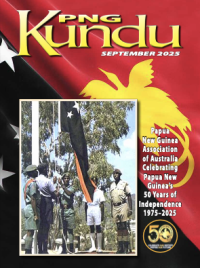14. What “Trusteeship” means, Part three
Paul Quinlivan’s Snapshots
Not that it was only Monte who was talking about deportation and “undesirables”. The case of Queen against Donald Drury (no relation to the then Director of Civil Aviation) was the first of the series of more than a hundred roneoed documents which became widely known as the “Q” Reports and came about because the case, which I prosecuted in Port Moresby on 20 September 1952, was so badly reported by the South Pacific Post that the trial judge, Judge Bignold, asked me if I would publish a “law report” on what actually happened. My report was also issued to the Law Students.
Drury worked with ComWorks and the facts which I proved were that, during the night, he forced his way, uninvited, into a Papuan home in Hanuabada village and banged an unopened bottle of rum on the table, making movements which the people in the house interpreted as indicating that he wanted a woman “unspecified” to have sex with him. I quoted a ruling from New Zealand (in Boland’s Case, 1907) which said that it was not necessary for the prosecution to nominate what purpose the Accused was in the house for but I also called witnesses to show that the body movements he had made had been made by other Whites who had intruded into other homes in Hanuabada recently and the interpretation I have mentioned was what a “man on the Clapham omnibus” would make.
Despite Drury’s claim that he went into the house because he thought a friend of his was there (a friend he named but whom nobody had heard of) he was convicted. The Judge gave a long speech in which he said, “Before the war, everyone knew that Papuans were protected in their homes by ‘The Law’ but, when the Army used the Wartime Emergency Powers to forcibly remove them from their homes in the Port Moresby area simply because they were Papuans, and resettle them elsewhere, doubts arose. The evidence in this case shows that Papuans no longer feel secure in their homes so it is necessary that ‘The Law’ restore their security. For this reason I want it known, far and wide, that anyone doing what this man has done must expect to be deported, as an “Undesirable Person”, in addition to any other punishment, and he will never be able to return no matter what business or other connections he might have here”.
The local weekly newspaper, the South Pacific Post, reported the case in its issue of 26 September 1952, under the headline “Man Fined for Entering Native House” but it failed to mention any part of the speech which Mr Justice Bignold made, or the order for deportation. My report rectified this omission.


